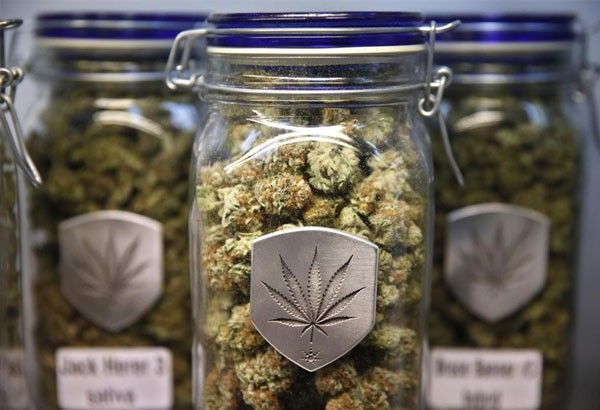Medical marijuana works, says Gloria Arroyo

MANILA, Philippines — She’s no pothead, but Speaker Gloria Macapagal-Arroyo has used cannabis medical patches, and she swears they work.
“I am an author of that (medical marijuana bill). I really believe in medical cannabis. As you know, I have my problem here and when I’m in a country that allows it, I put a pain patch, but here in the Philippines I cannot do it,” she told reporters yesterday, referring to chronic pain in her cervical spine.
“So I authored that bill because I believe that it can help me and many other people, but there was a lot of objection to the bill from the House and from the Senate. That’s why we are just letting the legislative process take its course. Right now it’s on second reading,” she said.
President Duterte earlier said that he took marijuana to keep him awake during international summits, citing his hectic schedule, but later clarified it was a joke.
The President has also said he was in favor of allowing the use of marijuana for medicinal purposes, but not for recreation – a sentiment shared by 2018 Miss Universe Catriona Gray.
Senate President Vicente Sotto III said there is no need for a new law to allow the use of marijuana for medical purposes because it is already covered by Republic Act 9165 or the Comprehensive Dangerous Drugs Act of 2002.
What the law allows, however, is the use of cannabinoid, the active ingredient in marijuana, for pain reduction. Drugs with cannabinoid are not available commercially in the Philippines, and can be used only upon the request of health facilities with the endorsement of physicians.
Isabela Rep. Rodolfo Albano III, principal author of the medical marijuana bill, expressed elation over the statements of Arroyo and the President.
“Unlike some medical practitioners, our leaders have an open mind on the advances of science and research. Patients with debilitating ailments really need medical cannabis, either for treatment or relief,” he said.
He said his proposal would give hope to persons “with debilitating disease, severe pain, intense seizures and persistent muscle spasms.”
He said most of these patients “are desperate for alternative treatment and have gotten tired of using only pharmaceutical drugs.”
“I feel for all the parents who have spent huge sums of money and are continuing to spend more. You see light at the end of the long, dark tunnel of your children’s suffering and pain,” he said.
He added that there have been research findings that children with frequent medical seizures who were given medical marijuana felt a great improvement in their condition.
Albano pointed out that his bill seeks to allow the use of medical marijuana under strict regulations to be issued by the Department of Health and the Food and Drug Administration.
He challenged critics of his proposal to “shed your fear of the unknown and open your minds to the potential benefits of medical marijuana.”
No way
As this developed, Albano and Rep. Lito Atienza of party-list Buhay have renewed their attacks against each other involving the controversial bill.
Without naming names, Atienza accused some of his colleagues of pushing the bill to enrich themselves and not to help people.
“Several lawmakers want to legalize medical marijuana because they themselves are eager to go into the business of cultivating the illegal drug and running dispensaries,” Atienza, also senior House deputy minority leader, said.
“Politicians are raring to go into marijuana trade. There are politicians who want to profit from legalized medical marijuana. This is clearly all about money – lots of money,” Atienza added.
But while Atienza did not accuse anybody specifically, Albano may have felt alluded to. “Atienza’s remark is very un-parliamentarian,” he said.
“He (Atienza) sees ghosts where there are none. He should name names. There is nothing wrong with the medical marijuana bill,” he said. “Don’t impute ill-motives on the authors. Our only intention is to provide relief to terminally ill patients who are in severe pain.”
Albano said medical cannabis “has been confirmed to have beneficial and therapeutic uses to treat chronic or debilitating diseases or medical conditions” just like the testimonies of doctors that at least 23 states in the US allow marijuana for medicinal use.
Atienza disclosed a “number of pro-legalization members of Congress have actually gone on field trips to Canada and America to look into the operations of medical marijuana dispensaries there.”
Presidential spokesman Salvador Panelo earlier said Duterte would sign into law any bill legalizing medical marijuana. Atienza, on the other hand, said “no such bill would arrive at the Palace for the President to sign.”
“The bill legalizing medical marijuana is already dead as far as this Congress is concerned,” he said, adding that the House minority prevented further floor deliberation on the measure.
The current Congress has only 20 session days left and most of these days are expected to be spent on passing the proposed 2019 national budget.
The legalization of medical marijuana will open the floodgates to abuse and addiction and create an unwanted public health emergency in the country, Atienza warned.
He said the susceptibility to abuse far outweighs any and all of the unproven benefits of allowing prescription marijuana.
“Marijuana is a poison. No amount of sugarcoating will make the illegal drug less toxic,” Atienza said.
The Philippine Medical Association, the professional organization of Filipino physicians, has rejected the legalization of medical marijuana, saying “it is contrary to the policy of the state to safeguard the wellbeing of its citizenry.”
At present, marijuana is tagged as a prohibited substance, just like methamphetamine hydrochloride or shabu, cocaine and heroin, under the Dangerous Drugs Act of 2002.
Under the law, mere possession of at least 500 grams of marijuana, or at least 10 grams of marijuana concentrate (resin or resin oil), is punishable by life in prison plus a fine of up to P10 million.
Carrying lesser quantities of the drug is punishable by 12 to 20 years in prison plus a fine of up to P500,000. – With Jess Diaz
- Latest
- Trending

































